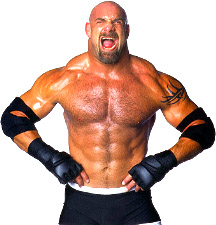
|
||||
|---|---|---|---|---|
|
Bill Goldberg
Birthdate: December 27th, 1966 Featured Signature Moves: Other Signature Moves: Puroresu Career History: Few wrestlers have felt the wrath of puroresu fans like Bill Goldberg. A successful wrestler in WCW who grew to be the most popular wrestler in the promotion, by 2002 Goldberg was a free agent as WCW folded and his contract expired. After injuring himself in a racing incident in the spring of 2002, in August Goldberg returned to wrestling in Japan. Over the next year and a half Goldberg would have five matches, score five pinfalls, and barely break a sweat while doing it. In 2002, one of the biggest stories in Japan was New Japan trueborn Keiji Mutoh leaving the promotion and joining All Japan Pro Wrestling. Mutoh also became the President of the promotion, and unfortunately it took him several years to grow accustomed to the role as at first he made a number of catastrophic mistakes that hindered the promotion. One of those mistakes was signing Bill Goldberg. Normally signing popular American wrestlers to compete on your show helps, but Mutoh used Goldberg in a way that only hurt the promotion. Goldberg had his first match in All Japan on August 30th, 2002 against Satoshi Kojima. Kojima had come to All Japan with Mutoh and was one of the future stars of the promotion. But on August 30th, 2002 he was defeated by Bill Goldberg in four minutes and two seconds. Goldberg's next match was even more puzzling. On August 31st, Goldberg faced Taiyo Kea. Kea was being pushed as one of the brightest young stars of All Japan, and the month prior he had scored a big singles victory over puroresu legend Genichiro Tenryu. The crowd was solidly behind Kea to seek revenge for Kojima's loss, but Kea lost in three minutes, 56 seconds.... six seconds faster then Kojima did. After his dismantling of All Japan's rising stars and screeching their pushes to a temporary halt, Goldberg left Japan and wouldn't return until November. Goldberg's next two appearances were in Wrestle-1 and were far less harmful even though his high appearance fee helped make both shows a financial disaster. On November 17th, 2002 Goldberg defeated Rick Steiner and on January 19th, 2003 he teamed with Mutoh to defeat Kronik. Since both wins were against American stars they did no harm, but while many thought that Goldberg was going to lose to an All Japan wrestler on the way out in return for his squash matches the previous summer they were sadly mistaken. Goldberg had his last match in Japan on January 4th, 2004 on the first Hustle event, defeating Naoya Ogawa. Afterwards he would return to America, and never wrestle in Japan again. Was Goldberg's stint in Japan really as bad as people say it was? While it did set All Japan and Kea back, one loss shouldn't derail a career permanently and both would have success in All Japan down the road. It is impossible to say how their careers would have changed and any analysis predicting their careers is simply opinion, there have been wrestlers that had pushes disappear that had nothing to do with invading American wrestlers. What is fact, however, is that Goldberg was extremely expensive and he did little to help draw for the promotion. It is also a fact that he came in, squashed All Japan's biggest rising stars, and left without ever getting pinned. The fans were happy to see Goldberg as he was very popular and Goldberg was fired up, but that popularity wasn't used in a positive way for the promotion. Luckily by 2004 Keiji Mutoh learned from his mistakes, but the promotion was in serious debt by then and the promotion still has not recovered from the financial blood-letting that took place in 2002 and 2003. I doubt we will see Goldberg in Japan again, but he certainly left his mark on puroresu. |
||||
|
